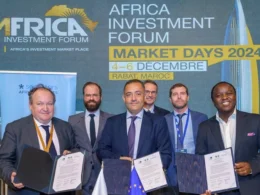Switzerland just made a power move in the emerging markets startup game. The Swiss State Secretariat for Economic Affairs (SECO) is relaunching its CHF5 million ($6.3 million) SECO Startup Fund with a fresh strategy and new co-managers, including emerging markets specialist Seedstars, to target startups across Africa, Asia, Latin America, and Eastern Europe.
This isn’t just another government fund throwing money at the wall. The refreshed SSF, originally founded in 1997, is betting on a specific thesis: that there’s a massive financing gap for proven startups in emerging markets that traditional VCs and banks won’t touch.
The patient capital play
Here’s where it gets interesting. While most investors are chasing quick exits and unicorn valuations, the SSF is offering something radically different: patient debt capital with 2-5 year terms and repayment structures that actually make sense for cash flow realities in emerging markets.
“We’re not looking for the next billion-dollar exit,” explained the fund’s positioning. “We’re targeting early-stage and growing companies with proven business models that just can’t access traditional growth financing.”
That’s a massive market opportunity. Across Africa, Asia, and Latin America, thousands of startups have validated their models and are generating revenue but hit a wall when trying to scale because they don’t fit the high-growth, high-risk profile that traditional VCs want, while also being too risky for conservative banks.
Swiss connections required
The fund has one key requirement that sets it apart from typical emerging market investors: companies must have “meaningful ties to Switzerland.” That could be through shareholders, suppliers, partnerships, or other business connections that align with SECO’s broader development cooperation strategy.
“SECO is proud to relaunch the SECO Startup Fund at a time when innovative businesses in our partner countries need it most,” said Christian Brändli, head of private sector development at SECO. “We believe in the power of catalytic capital to drive inclusive growth, and this vehicle helps Swiss partnerships play a meaningful role in that story.”
This Swiss connection requirement isn’t just bureaucratic box-ticking—it’s strategic. Switzerland has deep trade relationships and development partnerships across emerging markets, creating natural deal flow and due diligence advantages that purely financial investors often lack.
Seedstars brings the network
Seedstars Capital, the alternative investment platform that’s been quietly building one of the most comprehensive emerging markets startup networks, brings serious credibility to the SSF relaunch. Alongside co-manager iGravity, Seedstars has been supporting emerging fund managers and investing in technology companies across frontier markets for years.
The partnership makes sense strategically. Seedstars has the deal flow, local market knowledge, and portfolio support capabilities that government-backed funds often struggle to develop internally. Meanwhile, the SSF provides patient capital that aligns with Seedstars’ long-term approach to emerging market investments.
Targeting the overlooked
The fund is explicitly going after companies that “are often overlooked by traditional debt and equity providers.” That’s a huge market—think profitable fintech companies in Nigeria that need working capital, agtech startups in Kenya with proven traction but seasonal cash flows, or logistics companies in Brazil that need inventory financing.
While the fund is sector agnostic, it’s prioritizing three key themes: decent work, access to critical goods and services, and climate-smart capacities. These aren’t just feel-good impact categories—they represent some of the fastest-growing market opportunities in emerging economies.
The bigger development finance trend
The SSF relaunch reflects a broader shift in how development finance institutions are thinking about startup investing. Traditional development banks have struggled to effectively deploy capital into early-stage companies, while pure commercial investors often can’t justify the risk-return profile of emerging market startups.
Funds like the refreshed SSF represent a middle path: patient capital with development objectives but commercial discipline. It’s a model that other development finance institutions are watching closely.
What this means for emerging market startups
For startups in SECO’s target markets, the fund represents a potentially game-changing financing option. Patient debt capital with flexible repayment terms can be far more attractive than dilutive equity, especially for companies with proven business models that just need growth capital.
The Swiss connection requirement might seem restrictive, but it could actually be an advantage. Companies that can demonstrate meaningful Swiss partnerships may find themselves with access to not just capital but also market access, technical expertise, and other strategic benefits.
The real test will be execution. Government-backed funds often struggle with bureaucracy and risk aversion that can slow deal-making. But with experienced managers like Seedstars and iGravity running operations, the SSF might avoid the typical pitfalls of state-backed investment vehicles.












